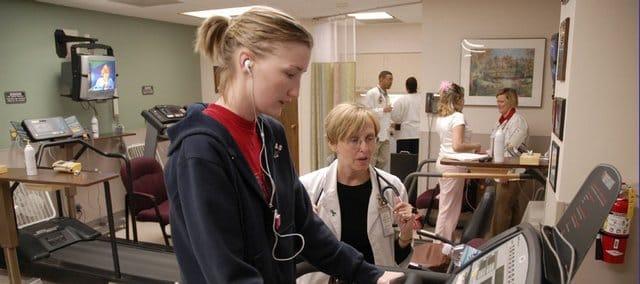Best Fitness Equipment for Hospitals and Physical Therapy Clinics
A Guide To Trainers For Health Assessment And Recuperation
Fitness equipment plays important roles in medical diagnoses, physical therapy, and everyday well-being. That’s why it’s vital to choose the best cardio and strength equipment for medical settings such as hospitals, physical therapy clinics and chiropractic centers. There are so many options that the decision can feel overwhelming. However, not all fitness equipment is created equal, but we’ve done the research to ensure that you end up with the right equipment for your Healthcare facility.
Optimize Your Healthcare Facility’s Fitness Equipment Funds
Hospital-grade fitness equipment is an important tool for preventing health problems, diagnosing medical conditions, and advancing recovery. Hospital-grade cardio trainers meet standards above and beyond the mainstream fitness machine market, such as ultra-low speed options and long rails for balance. Here are some important factors to consider while choosing equipment for a wellness setting.
1) Hospital-Grade Wiring
What gets fitness equipment approved for medical settings? One important factor is that hospital-grade cardio fitness equipment undergoes rigorous testing to ensure that it meets medical standards for conductivity and durability. Power cords and other electrical components meet special requirements in order to be protected by warranty in hospital settings.
2) All-Access Fitness Equipment
Cardio trainers selected for hospitals and clinics are designed for safe use by patients who aren’t steady on their feet. Long handrails on medical treadmills are a perfect example of an adaptation for healthcare settings. Treadmills for medical use are also built low to the ground for easier access for patients with limited mobility. Hospital-grade exercise bikes are also specially designed for easy mounting and dismounting.
Of course, not all of the accessibility features are geared towards physical limitations. Some fitness machines are adapted for safer use by people who have low vision or cognitive challenges. Raised icons on control buttons, bright coloring, and prominent color contrasting around moving parts are some adaptations that help accommodate patients or clients with special needs.
3) Stress Test Treadmills
Assessing cardio health is a key function of treadmills for hospitals and other health centers. Medical-grade treadmills are used in stress tests or stress electrocardiograms. A stress test is designed to raise the heart rate and determine whether blood flow is reduced in arteries to the heart. Cardio stress tests might be used in order to:
- evaluate the cause of chest pain.
- measure the heart strength.
- establish a baseline of heart data for reference.
- determine how well the heart tolerates activity.
Stress test treadmills may be packaged with electrodes, software, and other accessories.
4) Low Impact Cardio Trainers
Low impact fitness equipment is useful for any trainee, but it’s critical for physical therapy patients. Hospital-grade cardio trainers are especially low impact on sensitive connective tissues so that patients can exercise comfortably with less risk of injury and for prolonged periods of time.
Two popular low impact cardio trainers for clinics are:
- Upper body ergometers: Bike pedaling systems built for hands rather than feet.
- Recumbent bikes: Allows the rider lean back and pedal with their legs out front instead of beneath the body.
5) Strength Equipment for Rehab
Strength training equipment helps patients recover from injuries and develop healthier muscle tone. Most physical therapy clinics feature resistance bands for a variety of muscle exercises. Kettle bells are also popular for patients working on balance.
From rugged multi-gyms to soft hand-weights, there are many strength training products suitable for the medical market. Talking with a consultant in the field can help you make the most of your budget with equipment tailored to your clientele.
Get Tailored Advice
Every hospital and clinic has unique needs for fitness equipment. Some clinics focus on sports clients, while other may cater to wounded veterans. Contact us for help outfitting your wellness setting with the best equipment to suit your specific patients’ needs, while also respecting budgetary and space constraints.
Other Treadmill Reviews:
- Test HomePage
- NordicTrack Commercial X14i
- Echelon Stride
- NordicTrack C 590 Pro
- NordicTrack T 7.5 S - Pros & Cons (2024)
- Sole TD80 Treadmill Desk
- NordicTrack Commercial X11i
- NordicTrack T 8.5 S - Pros & Cons (2024)
- Horizon Elite T5
- Exerpeutic TF1000
- NordicTrack T 6.5 S - Pros & Cons (2024)
- ProForm Sport 5.0
- ProForm Premier 900
- ProForm ZT6
- NordicTrack FreeStride Trainer FS5i (Discontinued)
- Bowflex Max Trainer M5
- BowFlex TreadClimber TC100
- ProForm Power 795
- ProForm Sport 7.0
- NordicTrack Incline Trainer X15i
- NordicTrack C 1650 Treadmill
- Horizon Elite T9
- Official Boston Marathon Treadmill 4.0
- NordicTrack Treadmill Desk
- NordicTrack C 1630 Pro
- NordicTrack C 970 PRO



1 Comment